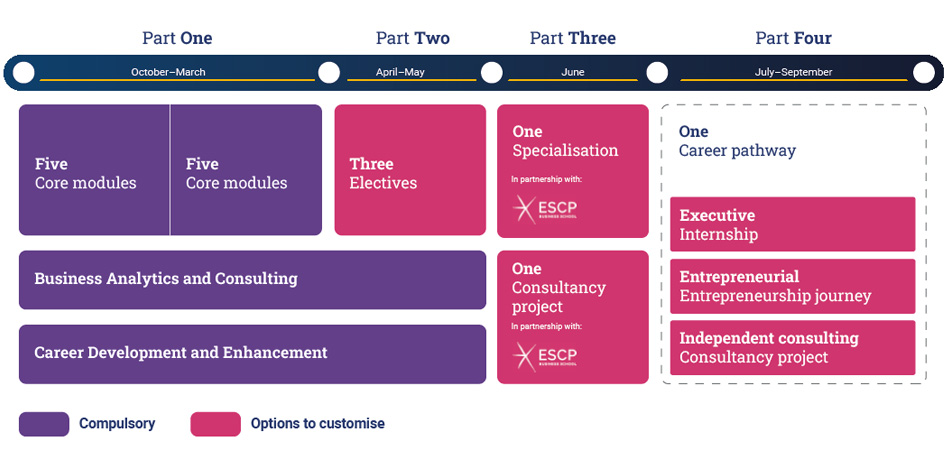Start your transformation with our full-time MBA programme
Cranfield School of Management’s Full-time MBA is a life-changing journey that redefines your future. As one of the UK's oldest and most prestigious MBA programmes, celebrating its 60th anniversary in 2024, our MBA has recently undergone a complete redesign in 2023 to remain one of the freshest and most innovative in the world.
The Cranfield Transformation MBA equips you with the skills and instincts needed to lead in a rapidly changing business landscape. This programme is not just about boosting your salary or securing a new role; it's about transforming your network, expanding your knowledge, and accelerating your career.
Our redesigned, one-year immersive experience offers unparalleled opportunities, including real client projects, an international study exchange, and access to a vast alumni network ranked #1 globally for its breadth. With a year-long and credit-bearing MBA career development programme and a number of 1-2-1 advisory and coaching support, you’ll unlock new connections, mindsets, and ambitions, preparing you to be the leader everyone turns to in the boardroom. Join a programme where transformation is more than a promise – it's a reality.
Overview
- Start date28 September 2026
- Duration12 months
- DeliveryYou will be assessed through a mixture of written projects and presentations.
- QualificationMBA
- Study typeFull-time
- CampusCranfield campus
Key features of the Transformation MBA at Cranfield
Problem-based and practice-led learning
At the core of our MBA programme is a commitment to practical, experience-driven learning. Designed to equip you with the skills to tackle complex business challenges, our programme immerses you in real-world problem-solving from day one. Throughout the year, you’ll work on live projects with leading companies, gaining invaluable exposure to real-world business issues.
Our key projects include:
- Business Analytics and Consulting Project
- International Consultancy Project
- Career Pathway Project
In both the Business Analytics and Consulting Project and the International Consultancy Project, you’ll collaborate with client companies to develop innovative, actionable solutions. Past projects have involved top organisations such as EY, Baringa Consultancy, Siemens Gamesa, Calvin Klein, McDonald’s, and the UK NHS.
The programme culminates with the Career Pathway Project, offering you the flexibility to pursue an internship, launch your entrepreneurial venture, or complete an independent project, ensuring you graduate with the hands-on experience to excel in your career.
Throughout the year, you’ll have the opportunity to attend inspiring networking events as part of our enlightening 'Speaker Event Series', where accomplished alumni return to share their success stories and insights, offering you valuable connections and inspiration.
Focus on career outcomes
Our newly introduced, credit-bearing Career Development and Enhancement module is designed to systematically guide you in achieving your post-MBA career goals. We offer three distinct career pathways - Executive, Entrepreneurial, and Independent - allowing you to tailor your MBA experience to your unique career aspirations.
Each pathway includes a major project-based module, giving you the option to pursue a full-time internship, embark on or expand an entrepreneurial venture, or undertake an independent consultancy project. Additionally, elective modules enable you to further specialise and align your studies with your desired career outcome.
Our career mentoring programme pairs you with successful alumni, providing invaluable insights and guidance as you navigate your MBA journey and transition into your first post-MBA role. This mentorship is a powerful tool in helping you advance confidently towards your career goals.
Focus on leadership development
Become a Boardroom Influencer
Cranfield’s 60+ years of leadership expertise ensures you develop the skills and insight to become a boardroom influencer. Our MBA programme emphasises responsible leadership, offering one-to-one executive coaching, access to an Executive in Residence, and in-depth analysis of your strengths and weaknesses to help you establish your unique leadership style. Every year we host a dedicated Leadership Week, with many leadership-enhancing and completely unique activities. You will participate in Personal Development Workshops throughout your year which cover cutting-edge, impactful leadership topics, including psychological safety, critical reflection, and conflict resolution, equipping you with the skills to lead effectively in today’s dynamic business environment.
Extensive international experience
The Cranfield Full-time MBA offers students a unique opportunity to spend a month at another top-ranked business school, ESCP, at one of its campuses in Madrid or Turin, deepening their understanding of global business practices. This immersive experience includes two weeks of credit-bearing study and a two-week consultancy project competition. With specialisations in consultancy, Fintech innovation, and luxury management, students collaborate with ESCP peers, exchanging ideas and building connections that foster international mobility and a global network. This is a transformative experience for personal and professional development.
The Cranfield experience
As the only dedicated postgraduate university in the UK, Cranfield offers an MBA experience like no other. With 70% of our faculty actively engaged in business and industry, our curriculum is infused with real-world expertise. Highlights include press conference training with real journalists in a TV studio and participation in the global Venture Capital Investment Competition, hosted by our Bettany Centre for Entrepreneurship. Our in-house TV suite hosts a green screen studio in which you will practice recording elevator pitches and host online webinars. You will also participate in cutting-edge gamification technology, such as our exciting Sustainable Futures simulation that was presented as COP24 to global leaders. All of these experiences are designed to challenge your thinking and encourage you to operate outside of your comfort zone.
Why choose the Transformation MBA at Cranfield?
With so many study options available, we understand that choosing where and what to study is a significant decision, not to mention investment. The Financial Times 2024 MBA rankings ranked Cranfield in the European Top Ten for both career progression and value for money - which means a high return on your investment.
At Cranfield School of Management, we believe in the power of transformation, tailored to each individual, that can change the trajectory of your life. Our alumni include countless CEOs, COOs, and CFOs who now lead Fortune 500 companies - a testament to the life-changing impact of our programme. We are so proud that they remain engaged and valuable members of the Cranfield community and actively participate in mentoring programmes, network events, consultancy projects and often offer internship opportunities.
A globally recognised MBA programme…
Course details
The Cranfield Transformation MBA is meticulously designed with a focus on career outcomes, placing project work at the heart of the curriculum. The customisable programme is structured in four distinct parts, offering flexibility and depth.
Course delivery
You will be assessed through a mixture of written projects and presentations.
Group Project and Individual Project
Group project
The programme includes a compulsory consultancy project. Working in small groups, you will apply what you have learnt in your core and elective modules to the project. You will help an organisation to tackle a contemporary challenge, researching the problem, analysing data and making recommendations for action.
Individual project
Internships and company-based projects allow you to apply your learning in a real business environment, get experience in a sector of interest, gain international exposure and can support your career progression. You can source an internship or project yourself, or use the School's alumni network or dedicated Careers and Employability Service to help you find the right organisation.
Modules
Compulsory modules
- Applied Organisational Behaviour
- Accounting
- Strategic Operations Management
- Strategic Marketing
- Economics of Organisations and Strategy
- Entrepreneurship and New Venture Creation
- Financial Management
- Strategic Management
- Project Management Introduction
- Global Macroeconomics and Business Environment
- Entrepreneurial Finance
- Challenges for Leaders: Managing People and Change
- Data Analytics and Decision Making
- Leadership in Action
- Leading Sustainable Business
Elective modules
Finance
- Corporate Financial Strategy
- Investment and Risk Management
- Managing International Mergers and Acquisitions
Entrepreneurship
- Leading and Managing the Family Enterprise
Strategy
- International Strategy
- Strategising in Challenging Contexts
- Strategic Human Resource Management in the 21st Century
- Driving Value Through the Supply Chain
Leadership
- Leaders as Thinkers: Leadership through Philosophy
- Negotiating in Business and Organisations
- Leading Sales and Customer Management Organisations
- Business Law
Strategy and Leadership
- Managing Strategic Innovation
- International Strategy
Projects
- Independent Project
Teaching team
Our faculty are dedicated to advancing management practices. As industry leaders with practical experience, they bring a wealth of knowledge to the classroom, ensuring that what you learn at Cranfield is both current and cutting-edge. Their close ties with organisations through consultancy, executive development programmes, and sponsored research enhance the relevance and impact of your education. Learn more about our distinguished faculty in the news section of our website. The Programme Director is Professor Michael Dickmann.
Accreditation
Cranfield School of Management is proud to be among the elite 1% of schools worldwide with triple accreditation of AACSB, AMBA and EQUIS, plus we are accredited as a business school by the Small Business Charter in recognition of our expertise and support for SMEs. Our MBA programme is recognised by the Chartered Management Institute (CMI) for meeting the rigorous standards required for management development and you will receive an additional professional qualification from the CMI, which will enhance your employability prospects post-graduation, especially in Europe.
We are also a proud member of GMAC, further underscoring our commitment to excellence in management education.
How to apply
Next steps
1. Check your eligibility
2. Book a call with our friendly team to discuss your questions and funding options
3. Ready to apply? – read our helpful application guide
How to apply
To apply, you first need to register on our online system. Once you've created an account, you can create, save, and edit your application form before submitting it.
After submitting your online application along with the required supporting documents, our admissions team will process it. You will then receive an email informing you whether your application is successful, unsuccessful, or if the course director or a senior faculty member would like to interview you before making a decision. Interviews are usually conducted via video conference or face-to-face if you can travel to Cranfield.
Early application discounts and deadlines
Competition for places on our Full-time MBA programme is strong, and top scholarships are often allocated early. We strongly recommend applying early to increase your chances of securing a place and any financial support, as well as benefitting from our early application discounts on the tuition fee. We process all applications on a continual basis; you do not need to wait for a deadline to apply.
We offer reduced tuition fees for those who apply early. This discount is in addition to any partial Cranfield scholarships you may be awarded. To ensure a smooth process, we suggest submitting your application and all supporting documents a few days before the discount deadline.
For September 2026
| Tuition fee discount*: |
Discount deadlines Apply before: |
| 10% off 2025/26 tuition fees (reduction of £6,900) |
10 November 2025 17:00 GMT |
| 10% off 2026/27 tuition fees (reduction of £4,950) |
Extended 19 January 2026 17:00 GMT |
| 5% off 2026/27 tuition fees (reduction of £2,475) |
23 March 2026 17:00 GMT |
| 3% off 2026/27 tuition fees (reduction of £1,485) |
11 May 2026 17:00 BST |
| No 2026/27 tuition fee discount |
Final deadlines: TBC July 2026 (International) TBC August 2026 (UK residents)** |
*Early Application Discount Terms and Conditions: To qualify for a tuition fee discount, a complete application must be submitted by the deadline specified in the table above. This discount is only applicable to the Full-time MBA programme starting in the 2026/2027 academic year and can be combined with partial scholarships offered by Cranfield School of Management. Promotional discounts are subject to change and may be withdrawn or amended at any time without prior notice. There is no cash alternative available.
**For UK & Ireland passport holders and residents with pre-settled or settled status only.
If you apply after our final deadline, we will do our best to place you in your first-choice start date. However, for international applicants, visa processing times may mean you will need to start with a later cohort.
Need guidance on your application?
Our MBA team is here to help you submit the best possible application. If you have any questions, please contact us at mbaenquiries@cranfield.ac.uk.


















